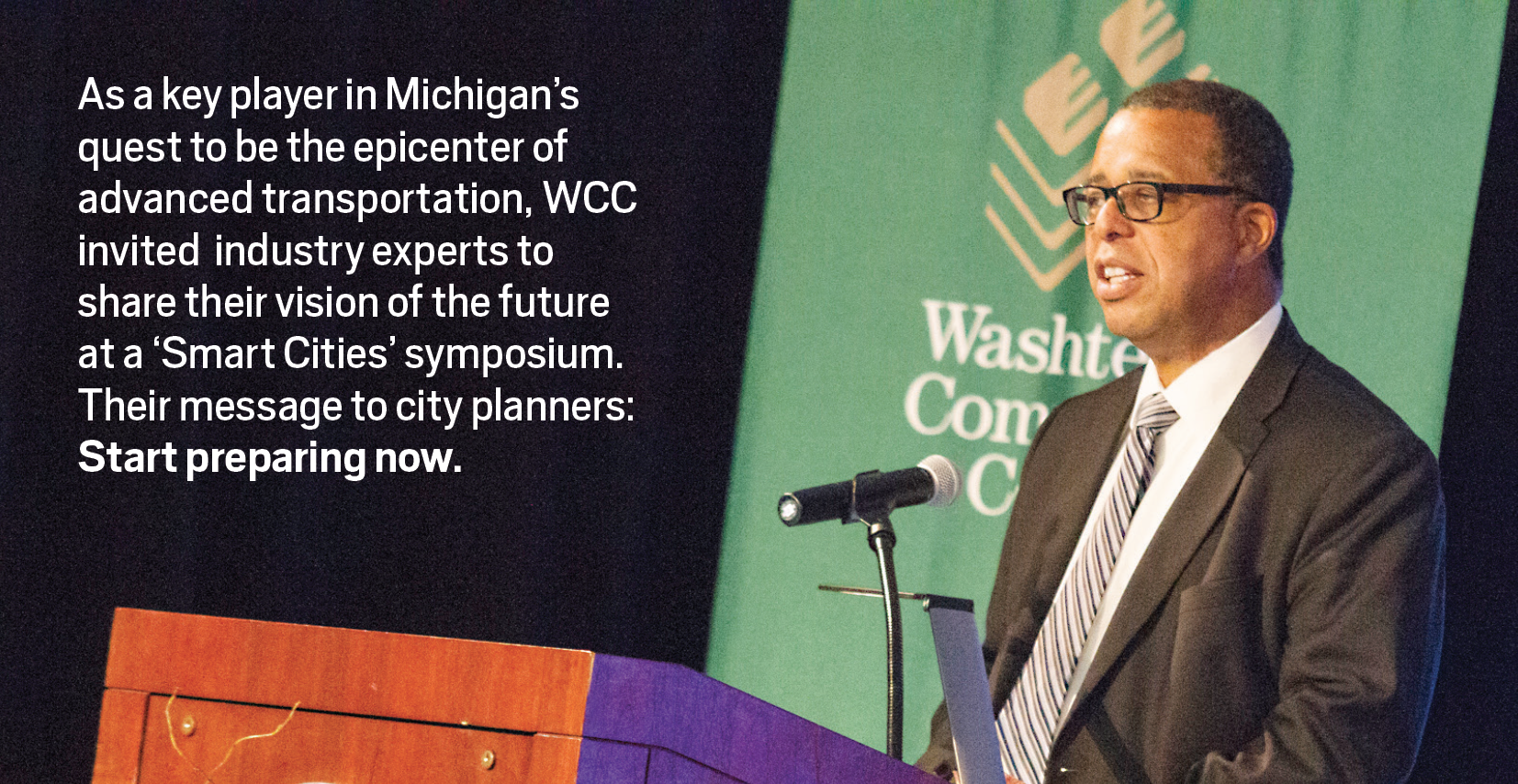
Ken Washington, Vice President of Research and Chief Technology Officer at Ford Motor Company, was the keynote speaker at Washtenaw Community College’s Smart Cities symposium on April 6. Washington joined high-profile speakers from the Michigan Department of Transportation, DTE Energy, the University of Michigan and Ann Arbor SPARK at the event, which brought together experts in mobility, autonomous and connected vehicles, and smart city infrastructure. (Photo by Kelly Gampel)
“Seek creative collusions of opportunity.” That was the advice Ford Motor Company’s Vice President of Research and Chief Technology Officer Ken Washington gave attendees at the Smart Cities symposium at Washtenaw Community College on April 6.
The day-long event focused on how new technology such as autonomous vehicles, smart grids and increasing amounts of data and computing power are changing cities for the better.
Washington joined presenters from the Michigan Department of Transportation, DTE Energy, Ann Arbor SPARK, the University of Michigan and others at the event. A common theme among the speakers was the need for greater cooperation between industry, government and education.
“Our goal at Ford is to imagine and design a future that works with cities and governments to develop technologies and to create living and dynamic ecosystems,” said Washington. “And the vehicles in those communities will be equally intelligent.”
During opening remarks, WCC President Dr. Rose B. Bellanca said that connected and autonomous vehicles, smart grids, changing urban demographics, and the collection and use of big data are a few of the things that are changing cities and transportation infrastructure.
“These changes are going to impact us in the same way that mass-produced automobiles impacted society 100 years ago,” said Bellanca. “It’s going to take long-range planning, systems-thinking and cross-collaboration between business, government and education to ensure we build cities that are livable, workable and sustainable for everyone.”
Attendees included city, county and state planners and engineers; economic development leaders; transportation experts; business and industry representatives and others involved with urban planning in Michigan, Indiana, Illinois and Ohio.
Ann Arbor SPARK president and CEO Paul Krutko told attendees that new technologies are fueling economic growth within city downtowns and core business districts.
“Cities become smart cities and smart cities become hotbeds for innovation,” said Krutko. “Today’s talented young workforce is not tethered to their jobs. They are choosing where to live, then looking for a job that suits their lifestyle.”
Craig Hupy, Public Service Area Administrator for the City of Ann Arbor, encouraged attendees to start now when it comes to smart city planning.
“You got to get on the bus, you can’t wait for the perfect technology to come along,” said Hupy.
“The end game is not technology in itself, but it’s how do you make cities more livable,” added Dr. James Sayer, Director of the University of Michigan Transportation Research Institute.
The day’s most energetic speaker was Seat Pleasant, Md., mayor Eugene Grant.
Mayor Grant partnered with IBM to make his rural city, located just outside Washington D.C., a smart city.
“Our challenge was addressing high unemployment and poverty,” said Grant. “The cost of running a government is no different than running a business. We decided to take a business approach to how we provide services for our residents. You can’t keep going to the taxpayer and raising taxes, so you need to find intelligent solutions.”
According to Grant, the city was able to make a business case for buying and renovating vacant homes by looking at property values.
“By looking at the data, we were able to determine that a vacant house caused the houses next to it to lose 13 percent of their value,” said Grant.
“This helped us make the financial business case for buying these vacant houses, turning them into smart houses, selling them and reusing the proceeds to make investments to attract new business.”
Mayor Grant’s final advice to attendees was to dream and think big. “Shoot for the moon, fall among the stars. Come here and ask questions. I guarantee that this community college will help you.”
Tags: Advanced Transportation Center, April 2018, On The Record, Smart Cities, autonomous vehicles, connected vehicles, ousearch_News_On The Record
